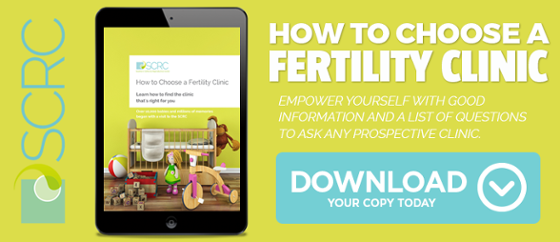
It is time to end the stigma around fertility treatment. At SCRC, we consider this a vital part of our mission. While we’ve made huge strides towards acceptance in the past few years, there are some areas of reproductive medicine which still retain a hint of taboo in public opinion. Pretty much everyone knows someone who has used IVF to build their family, and it has become a mainstream topic in the media. When the conversation turns to surrogacy, however, the mood often changes. There are still plenty of myths and misunderstandings about how surrogacy works, most of all around why someone might need to use a surrogate. Gestational surrogacy is a beautiful, life-changing, life-affirming option which deserves to be better understood. Today we’re going to take another step towards demystifying it.
What is surrogacy?
In brief, surrogacy is a type of third party reproduction where embryos are implanted in the uterus of a woman who will carry the pregnancy on behalf of the intended parent or parents.
In gestational surrogacy, embryos created through IVF are transferred to the surrogate’s uterus after fertilization and incubation in the lab. In a heterosexual couple, the embryo is usually created from the egg and sperm of the intended parents, which means that the baby will share 100% of its genetic identity with the intended parents. Sometimes an egg or sperm donor may be used, which means that the baby shares a 50% genetic identity with the intended parents or parent. The gestational surrogate has no genetic connection to the baby
To learn more about how surrogacy works, you can read our previous post on the process here.
Who needs surrogacy?
Surrogacy can open doors to parenthood for people who might otherwise never be able to have a child who is genetically linked to themselves. There are so many reasons why a surrogate may be the answer to your infertility problems. Here are a few of the most common:
Unexplained infertility
Sometimes a patient will go through 4 or 5 rounds of IVF, and in spite of everything looking great up to the transfer, never achieve pregnancy. If a woman’s eggs seem healthy and the embryos produced are of good quality but repeatedly fail to implant, gestational surrogacy may offer a way forward.
Hysterectomy or genetic lack of uterus
Women who have undergone a hysterectomy for medical reasons or who were born without a uterus cannot carry a pregnancy but may still be able to produce eggs for IVF. With the help of a surrogate, they could bring home a healthy baby.
Uterine issues
Some women have problems with their uterine lining which prevent embryos from implanting properly. This can cause repeated early miscarriages, even when everything else appears to be functioning well. Other uterine issues which mean that a surrogate is required include:
- Recurring fibroids
An unusually shaped uterus due to a genetic condition or injury
Life-threatening conditions
There are several conditions which can make it too dangerous for a woman to carry a pregnancy without substantial risk to her own life. One example is placenta
- Some heart defects or heart disease
- Kidney disease
- Severe diabetes
Severe postpartum depression
Postpartum depression is a very serious issue. In extremely severe cases it can lead to postpartum psychosis. These conditions aren’t talked about enough, but they deserve to be highlighted. If a woman has suffered from significant mental health issues after previous pregnancies, she may choose to use a surrogate for her next pregnancy. It’s a brave decision which can mean a drastic improvement in her quality of life and
Medications
Some women need to take medication which is not safe during pregnancy. Using a surrogate allows them to stay on the medication they need and keep themselves and their baby safe.
Advanced Maternal Age
While there have been many cases where women of advanced maternal age have used an egg donor and IVF to carry a healthy pregnancy to term, it's not always the right choice for everyone. In cases where a patient's age makes pregnancy riskier, a gestational surrogate can be a good option.
Single men who want to be fathers
The biological clock doesn’t only tick for women. Sometimes a man is at a place in his life when he’s ready to become a dad and doesn’t want to wait around for a relationship to make it happen. Surrogacy offers a chance to build a family on your terms.
Same-sex male couples
Surrogacy can be the answer for same-sex male couples who want to add a baby to their family. We work closely with the LGBT community to make sure they know all their options for building a family. Events like the Men Having Babies Conference are a wonderful way to learn more about surrogacy.
If you’re a woman who is considering using a surrogate, know that we understand how complicated the decision can be. Finding out that you are unable to carry a pregnancy to term can be devastating, but it does not have to mean that your dream of having a baby is over. If you’re a man thinking about finding a surrogate to carry a baby for you, know that you are far from alone on this journey. There is a community here to support you.
Surrogacy is often an emotional subject, but it should never be a shameful one. It can be the best option for all kinds of families, and a source of so much joy. The beauty of reproductive medicine, the big-hearted generosity of surrogates, and the courage of intended parents can come together to create the most wonderful thing imaginable: a brand new person to love.
Share this on social media:






